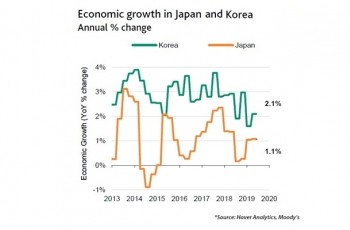シンクタンクからの眼 2023年8月20日
『賢者コラム』The Historical Background of Japan-Korea Economic Relations

The Historical Background of Japan-Korea Economic Relations
A bird’s-eye view of the historical trajectory of Japan-Korea economic relations reveals that the two countries have built a close cooperative relationship, significantly contributing to their postwar economic growth. Notably, from the 1980s to the 2000s, Japan played a pivotal role as a key investor and provider of technology for South Korea. During this period, Korean companies leveraged Japanese technological capabilities to expand their export industries, while Japan benefited from investments in South Korea as a production base. However, recent changes in the international landscape and domestic economic structures have gradually transformed this dynamic.
Recent Shifts in Japan-Korea Economic Relations
Over the past decade, Japan-Korea trade dependency has declined, and Japanese direct investments in South Korea have shown a downward trend. This shift is attributed to intensified competition between companies in both countries and changes in the division of labor. For instance, the technological advancement of Korean firms has enabled them to develop and manufacture products domestically, reducing reliance on Japanese companies. Additionally, Japan’s imposition of export controls on South Korea in 2019 had negative impacts on both economies, leading to a temporary cooling of economic relations.
Moves Toward Economic Cooperation Resumption
In 2023, both governments began taking concrete steps toward rebuilding economic cooperation. Measures such as easing export controls and resuming currency swap agreements have signaled progress toward normalization of economic relations. This reflects a shift necessitated by changes in the international environment, where mutual cooperation between Japan and South Korea is becoming increasingly essential.
The Need for Japan-Korea Economic Cooperation Amid Global Challenges
The significance of Japan-Korea economic cooperation is being re-recognized in light of international uncertainties. For example, the sluggish post-COVID economic recovery, the slowdown of China’s economic growth, and the restructuring of supply chains due to U.S.-China economic tensions present increasingly severe challenges for both nations. Additionally, the prolonged war in Ukraine has exacerbated risks such as inflation and rising resource prices, while the deepening climate crisis underscores the urgency of collaborative action. Under these circumstances, cooperation from the perspective of economic security is indispensable for both countries.
Key Areas for Japan-Korea Economic Cooperation
Several key areas stand out as opportunities for enhanced cooperation between Japan and South Korea:
1. Supply Chain Stability:
In strategic industries such as semiconductors, batteries, and rare metals, collaboration to stabilize supply chains is critical. Particularly amidst intensifying U.S.-China tensions, the reorganization of semiconductor supply networks is an urgent issue that Japan and South Korea must jointly address.
2. Green Energy:
As part of their climate change mitigation efforts, both countries need to cooperate in developing renewable and clean energy technologies. With shared goals of moving away from fossil fuels, technology exchange and joint development in this sector hold great promise.
3. Digital Transformation:
Cooperation in digital domains such as AI, IoT, and 5G is another priority. As the global economy transitions to a digital society, Japan and South Korea have the potential to explore new growth avenues through technological innovation in these fields.
4. Addressing Aging and Declining Birthrates:
Both nations face common social challenges of aging populations and declining birthrates. There is considerable scope for collaboration in advancing welfare and medical technologies. For instance, joint development of eldercare services using robotics and ICT could be a valuable area of partnership.
Future Prospects for Japan-Korea Economic Cooperation
Japan and South Korea share numerous common challenges and interests. By collaborating, they are well-positioned to uncover new avenues for economic growth. Specifically, their partnership in stabilizing supply chains, addressing the climate crisis, and fostering technological innovation in the digital realm will be instrumental in bolstering economic security for both nations. Deepening mutual trust and working together to tackle contemporary challenges will serve as the key to revitalizing Japan-Korea economic relations and paving the way for future growth.
(Nobuyuki Kasai, Principal Director of the Institute of Economic and Cultural Studies, President of the East Asian Association for Economic and Business Management, and Professor at SMU)




